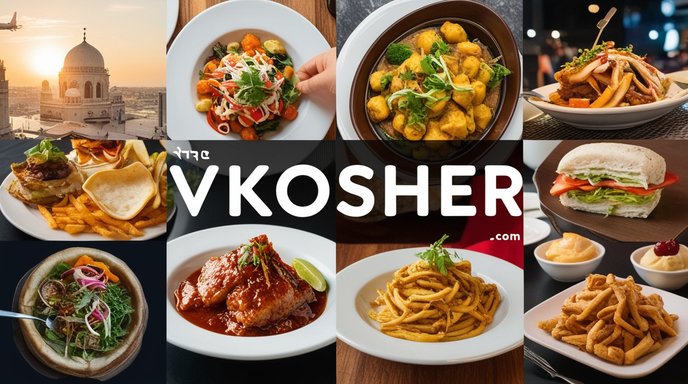Understanding Kosher Food: An In-Depth Exploration
Kosher food laws, rooted in Jewish tradition, have been a fundamental aspect of Jewish life for thousands of years. The term "kosher" itself comes from the Hebrew word "kasher," meaning "fit" or "proper." These laws are derived from the Torah, the central reference of the religious Judaic tradition, specifically from the books of Leviticus and Deuteronomy. Kosher dietary laws, known as "kashrut," encompass a broad array of regulations that govern what Jews can and cannot eat, how food must be prepared, and how utensils and kitchen appliances should be handled to maintain purity.
The Foundations of Kashrut
At the core of kashrut are the principles of separation and purity. The Torah outlines specific animals that are permissible to eat and others that are forbidden. For instance, only animals that both chew their cud and have split hooves are considered kosher. This includes animals such as cows and sheep, but excludes pigs and camels. Similarly, fish must have fins and scales to be deemed kosher, which rules out shellfish like shrimp and crab. Birds of prey are also non-kosher, while domesticated fowl like chickens and turkeys are acceptable.
One of the most significant aspects of kosher dietary laws involves the prohibition of mixing meat and dairy. This principle is derived from the commandment not to "boil a kid in its mother's milk," which is interpreted as a broader prohibition against combining meat and dairy products in any form. This separation extends to the preparation and consumption of food. In a kosher kitchen, separate utensils, dishes, and even appliances are used for meat and dairy products to ensure that they do not come into contact.
The Role of Ritual Slaughter
Another key component of kosher food is the method of slaughtering animals, known as "shechita." This practice is carried out by a trained individual called a "shochet." The process is designed to minimize the animal's suffering and is performed with a swift, precise cut to the throat, ensuring that the animal dies quickly and humanely. The blood of the animal must be drained, and certain fats and sinews are also removed. The importance of proper slaughtering techniques in maintaining the kosher status of meat reflects a deep respect for the life of the animal and the ethical treatment of food sources.
Inspection and Preparation
Once an animal is slaughtered, the meat undergoes a thorough inspection known as "bedikat ha'baal," where it is examined for any signs of disease or imperfections that would render it non-kosher. This inspection ensures that only meat from healthy animals is deemed suitable for consumption. Additionally, kosher meat must be soaked and salted to remove any remaining blood, in adherence to the biblical commandment that prohibits the consumption of blood.
The Importance of Certification
In contemporary settings, many kosher observances rely on certification by authoritative bodies. Kosher certification organizations provide oversight and ensure that food products and establishments adhere to kashrut laws. These organizations offer certification marks that indicate a product's kosher status. The certification process involves regular inspections and adherence to specific standards, including the sourcing of ingredients and the adherence to proper cleaning procedures.
Kosher in the Modern World
The application of kashrut has evolved to meet the demands of modern food production and consumption. Kosher laws now encompass a wide range of products, from packaged foods to restaurant offerings. Many food manufacturers and restaurants seek kosher certification to cater to the dietary needs of Jewish consumers, as well as to appeal to a broader market interested in ethical and high-quality food production practices.
Challenges and Innovations
As food technology advances, maintaining kosher standards presents new challenges and opportunities. The development of plant-based and lab-grown meat products raises questions about how these innovations fit within traditional kosher laws. For instance, determining whether synthetic or plant-based alternatives meet the criteria for kosher can involve complex interpretations of the rules. Additionally, the production of kosher dairy products requires careful monitoring to ensure that no non-kosher additives or processing agents are used.
The globalization of the food industry has also introduced a variety of cuisines and food practices into the kosher domain. As a result, there is a growing demand for kosher versions of international dishes and products, leading to innovations in how kosher foods are prepared and consumed.
Education and Awareness
Educating both Jewish and non-Jewish communities about kosher practices is crucial for fostering understanding and respect. Many people are unfamiliar with the intricacies of kosher laws and the reasons behind them. Increasing awareness through educational programs, culinary events, and outreach can help demystify kosher food and highlight its significance in Jewish tradition.
Conclusion
Kosher food laws are more than a set of dietary restrictions; they represent a deep-seated tradition that intertwines faith, ethics, and cultural identity. The principles of kashrut encompass a comprehensive framework for what is deemed fit for consumption, reflecting values of purity, respect for life, and adherence to divine commandments. As the food industry continues to evolve, the commitment to maintaining kosher standards ensures that these age-old practices remain relevant and respected in a modern context. Understanding the principles of kosher food not only provides insight into Jewish dietary practices but also underscores the broader significance of food in shaping cultural and ethical values.
Kosher food laws, rooted in Jewish tradition, have been a fundamental aspect of Jewish life for thousands of years. The term "kosher" itself comes from the Hebrew word "kasher," meaning "fit" or "proper." These laws are derived from the Torah, the central reference of the religious Judaic tradition, specifically from the books of Leviticus and Deuteronomy. Kosher dietary laws, known as "kashrut," encompass a broad array of regulations that govern what Jews can and cannot eat, how food must be prepared, and how utensils and kitchen appliances should be handled to maintain purity.
The Foundations of Kashrut
At the core of kashrut are the principles of separation and purity. The Torah outlines specific animals that are permissible to eat and others that are forbidden. For instance, only animals that both chew their cud and have split hooves are considered kosher. This includes animals such as cows and sheep, but excludes pigs and camels. Similarly, fish must have fins and scales to be deemed kosher, which rules out shellfish like shrimp and crab. Birds of prey are also non-kosher, while domesticated fowl like chickens and turkeys are acceptable.
One of the most significant aspects of kosher dietary laws involves the prohibition of mixing meat and dairy. This principle is derived from the commandment not to "boil a kid in its mother's milk," which is interpreted as a broader prohibition against combining meat and dairy products in any form. This separation extends to the preparation and consumption of food. In a kosher kitchen, separate utensils, dishes, and even appliances are used for meat and dairy products to ensure that they do not come into contact.
The Role of Ritual Slaughter
Another key component of kosher food is the method of slaughtering animals, known as "shechita." This practice is carried out by a trained individual called a "shochet." The process is designed to minimize the animal's suffering and is performed with a swift, precise cut to the throat, ensuring that the animal dies quickly and humanely. The blood of the animal must be drained, and certain fats and sinews are also removed. The importance of proper slaughtering techniques in maintaining the kosher status of meat reflects a deep respect for the life of the animal and the ethical treatment of food sources.
Inspection and Preparation
Once an animal is slaughtered, the meat undergoes a thorough inspection known as "bedikat ha'baal," where it is examined for any signs of disease or imperfections that would render it non-kosher. This inspection ensures that only meat from healthy animals is deemed suitable for consumption. Additionally, kosher meat must be soaked and salted to remove any remaining blood, in adherence to the biblical commandment that prohibits the consumption of blood.
The Importance of Certification
In contemporary settings, many kosher observances rely on certification by authoritative bodies. Kosher certification organizations provide oversight and ensure that food products and establishments adhere to kashrut laws. These organizations offer certification marks that indicate a product's kosher status. The certification process involves regular inspections and adherence to specific standards, including the sourcing of ingredients and the adherence to proper cleaning procedures.
Kosher in the Modern World
The application of kashrut has evolved to meet the demands of modern food production and consumption. Kosher laws now encompass a wide range of products, from packaged foods to restaurant offerings. Many food manufacturers and restaurants seek kosher certification to cater to the dietary needs of Jewish consumers, as well as to appeal to a broader market interested in ethical and high-quality food production practices.
Challenges and Innovations
As food technology advances, maintaining kosher standards presents new challenges and opportunities. The development of plant-based and lab-grown meat products raises questions about how these innovations fit within traditional kosher laws. For instance, determining whether synthetic or plant-based alternatives meet the criteria for kosher can involve complex interpretations of the rules. Additionally, the production of kosher dairy products requires careful monitoring to ensure that no non-kosher additives or processing agents are used.
The globalization of the food industry has also introduced a variety of cuisines and food practices into the kosher domain. As a result, there is a growing demand for kosher versions of international dishes and products, leading to innovations in how kosher foods are prepared and consumed.
Education and Awareness
Educating both Jewish and non-Jewish communities about kosher practices is crucial for fostering understanding and respect. Many people are unfamiliar with the intricacies of kosher laws and the reasons behind them. Increasing awareness through educational programs, culinary events, and outreach can help demystify kosher food and highlight its significance in Jewish tradition.
Conclusion
Kosher food laws are more than a set of dietary restrictions; they represent a deep-seated tradition that intertwines faith, ethics, and cultural identity. The principles of kashrut encompass a comprehensive framework for what is deemed fit for consumption, reflecting values of purity, respect for life, and adherence to divine commandments. As the food industry continues to evolve, the commitment to maintaining kosher standards ensures that these age-old practices remain relevant and respected in a modern context. Understanding the principles of kosher food not only provides insight into Jewish dietary practices but also underscores the broader significance of food in shaping cultural and ethical values.




